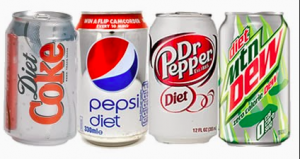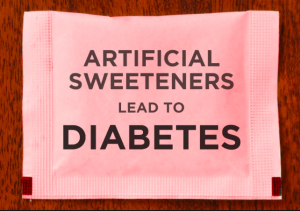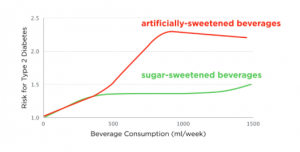
Image Credit:
https://www.today.com/health/diet-soda-doing-these-7-awful-things-your-body-1C6558748
How often do you look at the ingredients of your diet soda, sports supplements, or “sugar free” snacks? Often these drinks or foods contain artificial sweeteners which have previously been approved for human consumption by the Food and Drug Administration (FDA). When we’re consuming food without knowing the ingredients, we are turning a blind eye to personal health and trusting the FDA along with the manufacturers without conducting proper research.
If the FDA believes it’s safe to drink diet soda, then it must be so? Well, that depends on your definition of safety. Many experiments previously conducted on the safety of artificial sweeteners had multiple variables that did not get tested. For example, the amount of diet soda that someone may drink is different from one person to another. Many people drink more than the amount the FDA has tested for.
Recently, researchers at Ben-Grunion University in Israel, and Nanyang Technical University in Singapore conducted a collaborative study on the six most popular artificial sweeteners (aspartame, sucralose, saccharin, advantame, neotame, and acesulfame potassium-k) and their effects on digestive gut microbes (things living in the gut that help to digest our food).
The results from their study Measuring Artificial Sweeteners Toxicity Using a Bioluminescent Bacterial Panel revealed that the bacteria found in the digestive tract became toxic at only 1mg/ml dosage. If gut bacteria is sensitive to only a small amount of these substances, then it can cause a variety of health issues when exposed to higher concentrations.

Image Credit:
https://www.drperlmutter.com/artificial-sweeteners-change-gut-bacteria/
When a person buys diet soda, or “sugar-free” soda as a replacement to the “normal” version, they are doing so because they wish to lower their calorie intake, lose weight, or prevent diabetes. The Multiethnic Study of Atherosclerosis found that people consuming diet sodas on a daily basis are associated with a 36% increased risk for metabolic syndrome (biological and physiological abnormalities that can lead to cardiovascular disease) and also a 67% increased risk for type 2 diabetes. Isn’t the purpose of drinking “sugar-free” soda that you don’t develop diabetes in the first-place?

Image Credit:
https://danionealnutrition.com/2016/06/15/when-science-stuffed-up-the-case-against-artificial-sweeteners/
This graph shows the increased rate of developing Type 2 Diabetes when drinking artificially- sweetened beverages compared to sugar-sweetened beverages. Overall, we can see that people consuming the sugar-sweetened beverage are at a smaller risk, and therefore artificial sweeteners are not actually a “smart way” to prevent or avoid diabetes.
Amidst the popular modified food we are exposed to which allows us to preserve it for a long time, and the all the fast-food options, we forget to think smartly about what we are exposing our bodies to. These harmful chemicals definitely leave a footprint on our health. Next time, before choosing a modified option at the grocery store think about what you will be putting into you’re body and the effects it can have.
Written by Jasleen Jassal
